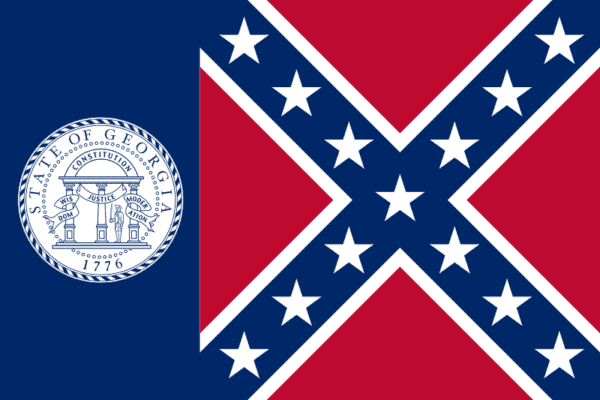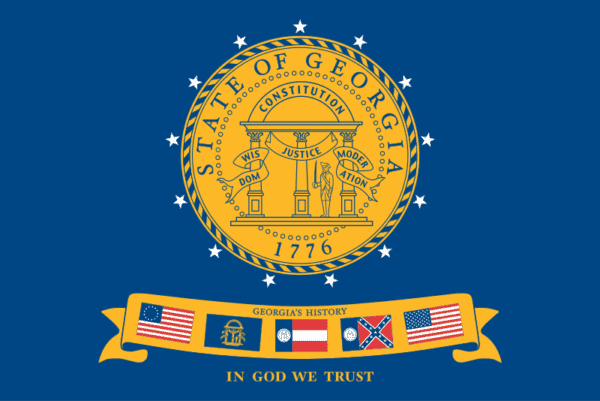Georgians and Their Flag
Andy Nowicki, American Renaissance, January 2003

The Georgia State flag from 1956 until 2001.
The impressive showing by Republicans on November 5, 2002, serves as a reminder that white voters still count — which shouldn’t be surprising, since they are still the majority. In Georgia, where Democratic governor Roy Barnes suffered an unexpected defeat to Republican challenger Sonny Perdue, whites may have felt especially motivated. Mr. Barnes had angered a great many whites by unilaterally removing the Confederate Battle Flag from the state flag, and then ramming the change through the state legislature.

The Georgia State flag from 2001 until 2003.
This move won fawning plaudits from the Atlanta media, but country folk — as well as many suburban dwellers outside the I-285 perimeter around Atlanta — reacted differently. For over a year, in many a yard off many a country road, there were “Let Us Vote” signs, displaying the old state flag. These signs referred to the referendum in Mississippi, in which citizens voted to keep the battle-flag design in their state flag.
As election time neared, these signs had a new message: “Boot Barnes.” Mr. Barnes’s public appearances drew protests from the Sons of Confederate Veterans and other Southern heritage groups. Mr. Perdue, evidently seeing potential pay dirt, said that if he were elected he would hold a referendum on the flag. Still, Mr. Barnes overwhelmingly outspent Mr. Perdue, and in the week leading up to the election, led by a comfortable margin in all polls.
Sonny Perdue’s stunning victory sent convulsions through the South, and indeed the nation. Mr. Perdue will be the first Republican governor of Georgia since Rufus Bullock and his posse of Reconstructionist carpetbaggers and scalawags took over in 1868. Did the flag issue convince “yellow dog Democrats” to go over to the party of Lincoln? One cannot know for sure, but whites voted Republican in greater numbers than ever before.
Since Lyndon Johnson signed the Civil Rights Act of 1964, whites in the South, who had voted strongly for FDR and JFK, slowly began to drift towards the GOP in national races, even if they continued to vote Democrat locally. Since blacks in the South overwhelmingly vote Democrat, the party became an uneasy biracial coalition of black activists and white, conservative “Dixiecrats.”
Mr. Barnes’s capitulation on the flag speeded up the process of racial polarization in Southern politics. The elderly white “yellow dogs” are dying out, and the Democratic Party is becoming an association of blacks and white liberals pushing affirmative action and multiculturalism, while the Republican Party is overwhelmingly white.
Georgia Democratic senator Zell Miller, who has defied his own party and sided with President Bush on several key issues, recently decried the leftward tilt of his party, pointing out that many former Georgia Democrats are leaving. What went unmentioned but understood was the race of those alienated voters. Mr. Miller was underlining the need to reconnect with traditional Southern whites.
Why do Georgians feel so strongly about a piece of cloth? Many are angry about changing the flag because it is yet another assault on Southern culture by foreign invaders and domestic turncoats, an assault that began with the depredations of Sherman and continued through the crusades of the 1960s. To give up the flag would give one more victory to an enemy that wants to destroy their way of life. As one bumper sticker reads: “Lee Surrendered; I Didn’t.”
White Southerners have proven to be a resilient group. By and large, they refuse to commit cultural suicide, or submit to demands to undergo collective sensitivity training. They had the guts to greet John Rocker with a standing ovation when he came out of his suspension two years ago, and this year they came to the polls to end Roy Barnes’s political career. Their enemies are right to suspect that support for the flag is a sign of racial consciousness — racial consciousness that is growing bolder and more confident.















